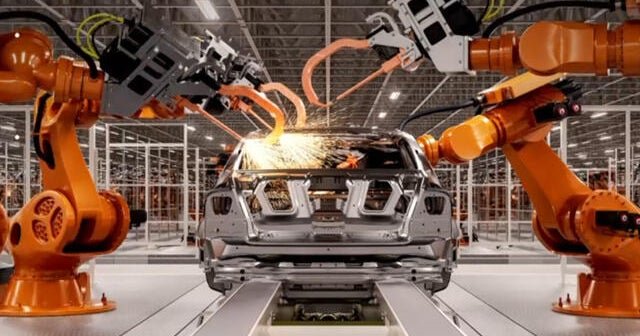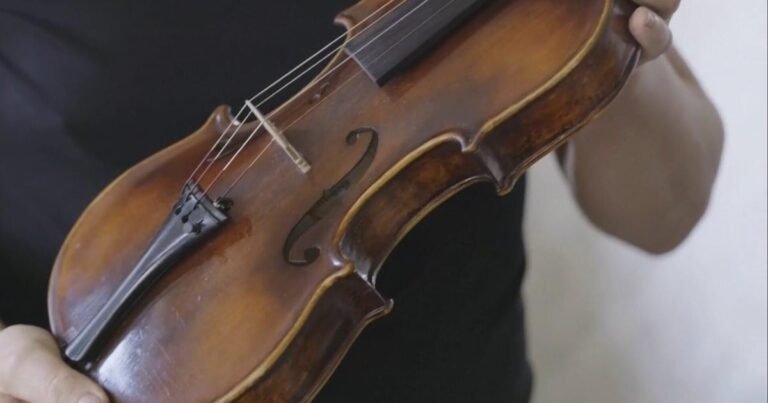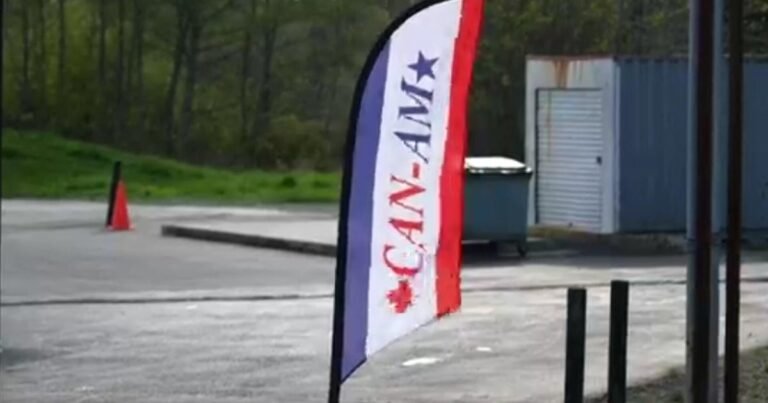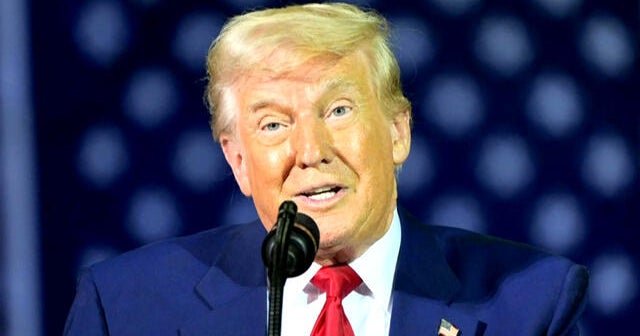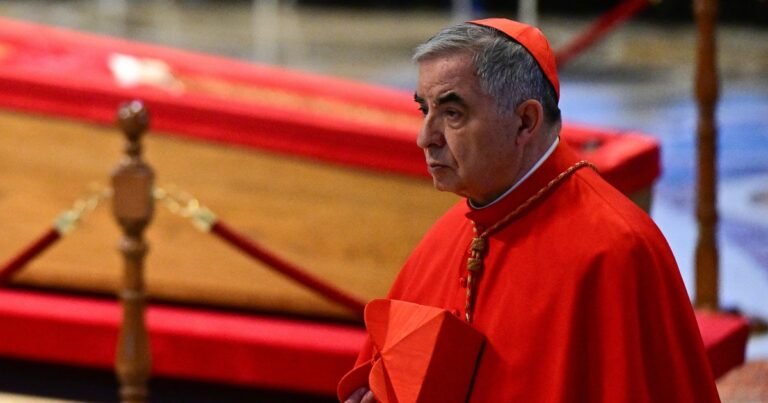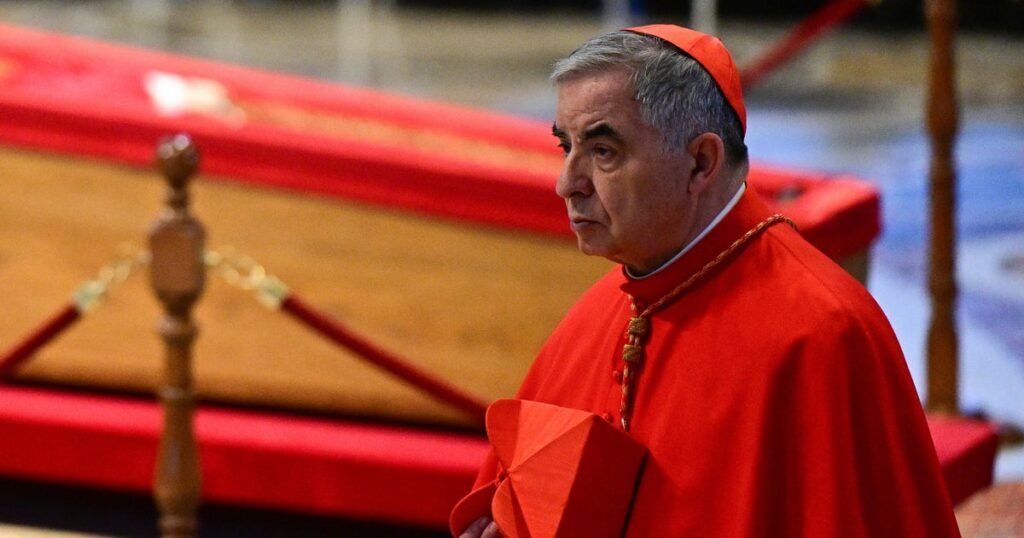
The Italian cardinal at the heart of the Vatican’s “trial of the century,” Angelo Becciu, announced Tuesday he was withdrawing from participating in the upcoming conclave to elect a new pope for “the good of the church,” ending days of drama that had overshadowed the proceedings.
The status of Cardinal Becciu, who was convicted of fraud and embezzlement in 2023, has dominated discussions in the days after Pope Francis’ death amid questions about whether he would participate in the conclave to elect Francis’ successor or not.
After his 2020 downfall, Becciu had said he would not participate in any future conclave. But in recent days he had asserted he had a right to enter the Sistine Chapel with other cardinals on May 7.
On Tuesday, the 76-year-old Italian issued a statement through his lawyers that said: “Having at heart the good of the church, which I have served and will continue to serve with fidelity and love, as well as to contribute to the communion and serenity of the conclave, I have decided to obey as I have always done the will of Pope Francis not to enter the conclave while remaining convinced of my innocence.”
TIZIANA FABI/AFP via Getty Images
Who is Angelo Becciu?
Before allegations of embezzlement and nepotism surfaced about five years ago, Becciu was considered one of Francis’ top advisers.
He was once an influential Vatican chief of staff who was a leading papal contender himself.
Born in 1948 in Pattada, Sardinia, the 76-year-old was ordained to the priesthood in 1972, according to the College of Cardinals Report, an independent research website which profiles cardinals. In 2011, Pope Benedict XVI appointed Becciu as Substitute for General Affairs in the Secretariat of State, the third most powerful official in the Vatican, the report said.
Pope Francis later ordained Becciu as cardinal in 2018 and appointed him as Prefect of the Congregation for the Causes of Saints.
But he fell from grace in 2020 when Francis forced him to resign his job as head of the Vatican’s saint-making office and his rights as a cardinal because of allegations of financial misconduct.
“The trial of the century”
The trial focused on the Vatican secretariat of state’s 350 million euro investment in developing a former Harrod’s warehouse into luxury apartments. Prosecutors alleged Vatican monsignors and brokers, including Becciu, fleeced the Holy See of tens of millions of euros in fees and commissions and then extorted the Holy See for 15 million euros to cede control of the London building.
Becciu was convicted in December 2023 of embezzlement stemming from the original investment of 200 million euros in a fund that bought into the property, as well as for his 125,000 euro donation of Vatican money to a charity run by his brother in Sardinia, a large Italian island in the Mediterranean Sea.
Becciu was also convicted of using Vatican money to pay an intelligence analyst, Cecilia Marogna, who in turn was convicted of using the money for herself.
Becciu denied wrongdoing and is appealing the conviction and 5 ½-year prison sentence and had participated in the pre-conclave meetings, including on Monday.
How does Becciu’s withdrawal impact the conclave?
Becciu’s withdrawal doesn’t affect the Vatican’s official statistics about the conclave because internally it never considered him eligible to vote.
There remain 135 cardinal electors, though Vatican spokesman Matteo Bruni confirmed Tuesday that two had formally announced they weren’t coming due to health reasons, bringing the number of electors down to 133.
Becciu is under the age limit of 80 and technically eligible to vote, but the Vatican’s official statistics list him as a “non-elector.”
The Vatican document regulating a conclave, known by its Latin name Universi Dominici Gregis, lays out the criteria for electors, making clear that cardinals under 80 have the right to elect the pope, except those who have been “canonically deposed or who with the consent of the Roman Pontiff have renounced the cardinalate.” It adds that after a pope has died, “the College of Cardinals cannot readmit or rehabilitate them.”
There has never been any clarity on what exactly Becciu renounced or how: The one-line statement issued by the Vatican press office on Sept. 24, 2020, said merely that Francis had accepted Becciu’s resignation as prefect of the Congregation for the Causes of Saints “and his rights connected to the cardinalate.” There is no indication he has been sanctioned canonically.
Francis’ letters to Becciu before he died
Italian daily Domani reported last week that during the initial pre-conclave discussions, Becciu was presented with two letters signed by Francis before he died saying he should not participate in the conclave. Becciu’s reference to Francis’ will in his statement Tuesday suggests that the letters were the tipping point that convinced him to withdraw from the vote.
Becciu rose to prominence and power under conservative Pope Benedict XVI and is very much affiliated with the conservative Vatican old guard. While he initially became a close adviser to Pope Francis, Becciu’s subsequent downfall at the hands of Francis might suggest he would have voted for someone keen to undo some of Francis’ reforms.
After he forced Becciu’s resignation, Francis visited Becciu on occasions and allowed him to participate in the life of the Vatican. But Francis also changed Vatican law to allow the city state’s criminal tribunal to prosecute him.
Pope’s absolute power and the trial’s fairness
Questions, meanwhile, have continued to swirl about the integrity of the trial that convicted Becciu and eight others. During the proceedings, the court heard that Francis intervened on several occasions on behalf of the prosecutors and that the prosecution’s prime witness against Becciu was coached and manipulated by outsiders.
Defense lawyers discovered that the pope had secretly issued four decrees during the investigation to benefit prosecutors, allowing them to conduct intercepts and detain suspects without a judge’s warrant.
Lawyers cried foul, arguing such interference by an absolute monarch in a legal system where the pope exercises supreme legislative, executive and judicial power violated their clients’ fundamental rights and robbed them of a fair trial.
The tribunal rejected their objections, but in recent weeks even more evidence has emerged about the outside manipulation of the witness and apparent collusion with Vatican prosecutors and gendarmes to target Becciu.
Becciu is free pending the appeal, which is scheduled to begin in September.
